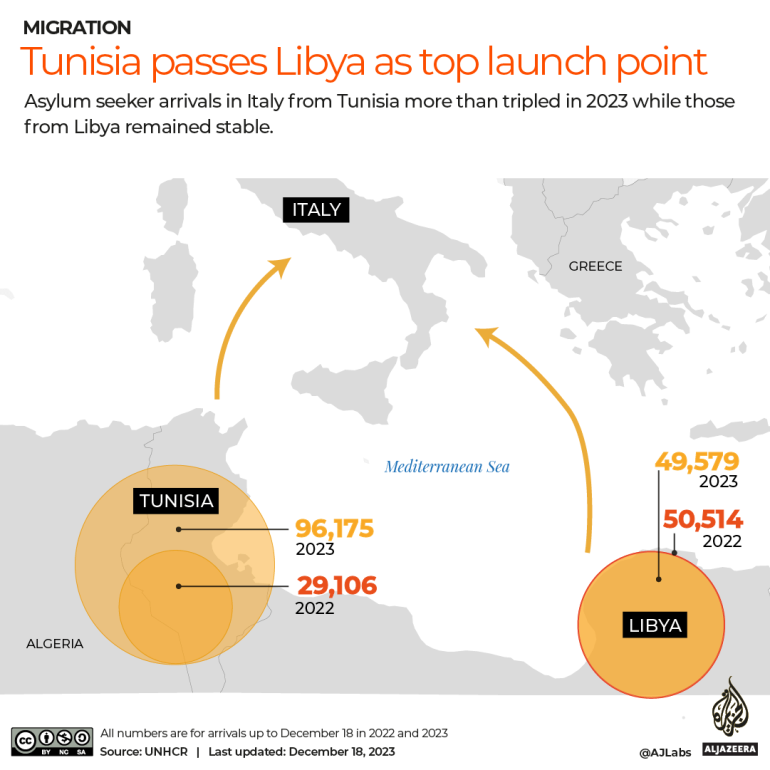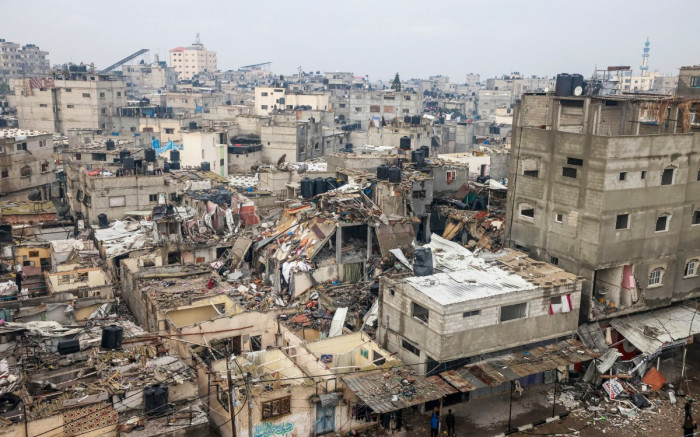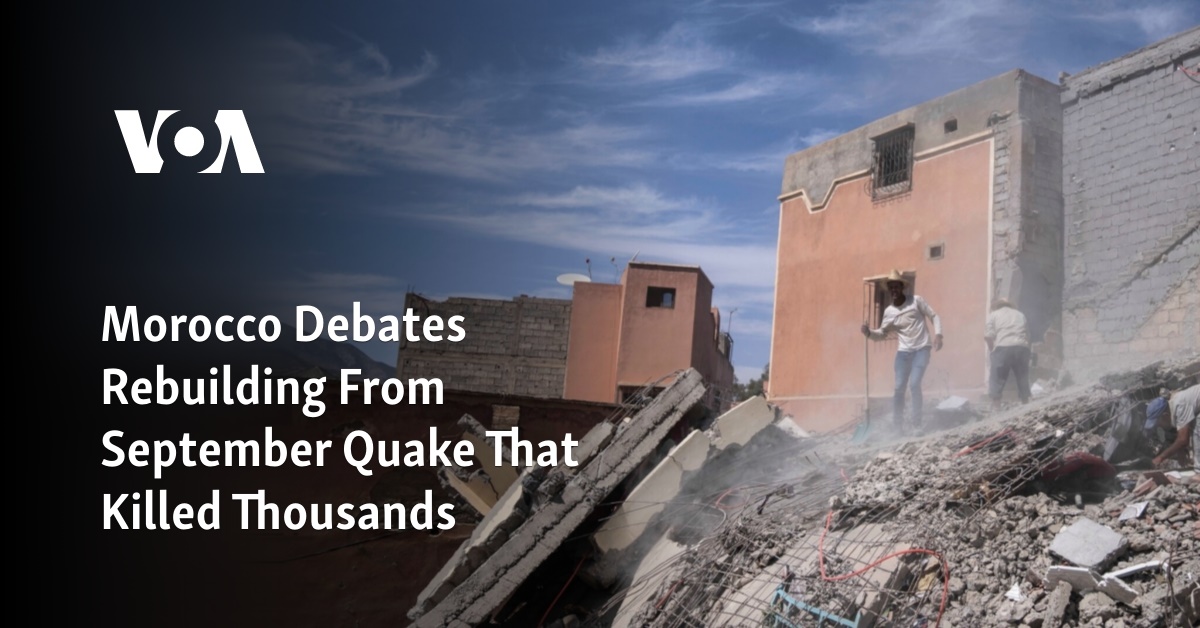
Eight years after the image of three-year-old Alan Kurdi lying face down on a beach in Turkey shocked the world, images of lifeless bodies of asylum seekers washed up on the coast of Italy’s Calabria region in February shocked people again sparked worldwide outrage.
EU Commission President Ursula von der Leyen reacted to the tragedy Shipwreck just a few meters from the coast of Steccato di Cutro, promising to “double our efforts”.
“Member states must move forward and find a solution. Now,” she said.
But as 2024 begins, activists and experts told Al Jazeera that Europe is seeking increasingly drastic solutions in 2023 to curb NGO search and rescue operations and outsource its border management to other countries.
The International Organization for Migration (IOM) estimates that at least 2,571 people have died trying to cross the Mediterranean this year – one of the deadliest years ever. Since 2014, the United Nations agency has counted at least 28,320 men, women and children who have lost their lives trying to reach Europe.
“What’s new is the popularity of the idea that you can externalize asylum processing,” said Camille Le Coz, deputy director for Europe at the Migration Policy Institute. “This is something we are likely to see more progress on, despite uncertain legal foundations.”
Externalization of asylum
According to the Office of the UN High Commissioner for Refugees, at least 264,371 asylum seekers entered Europe by boat and land in 2023 – a 66 percent increase compared to the previous year and the highest figure since 2016. Six out of ten of them landed on Italian shores .
Flavio Di Giacomo, an IOM spokesman, said these figures were a far cry from those of 2015, when more than a million people reached European shores by sea.
“There is no real emergency,” Di Giacomo told Al Jazeera. “These are very manageable numbers and more should be done to give people arriving by sea access to a protection system.”
Nevertheless, hardliners are sounding the alarm about migration. British Prime Minister Rishi Sunak was accused of using “toxic” rhetoric in December after warning that migration would “overwhelm” European countries without decisive action.
His comments came during a four-day political event in Rome organized by far-right Italian Prime Minister Giorgia Meloni a few weeks after his Flagship bill The UK Supreme Court has declared it unlawful to deport asylum seekers to Rwanda to process their claims.
Meloni, who also governs with a hard-line nationalist agenda focused on immigration, has warned that Italy would not become “Europe’s refugee camp.”
Similar to her British ally, Meloni had signed an agreement to send asylum seekers arriving in Italy to another country. Albania had agreed to process its claims at two facilities run by Italian officials under Italian jurisdiction. The five-year deal, announced in November, was blocked by the Balkan country’s Constitutional Court for violating the constitution and international conventions.
Le Coz told Al Jazeera that Georgia, Ghana and Moldova are also negotiating with European Union member states to sign agreements that will allow them to carry out part or all of their asylum procedures on their territory. It is unclear whether these agreements will receive the green light from the courts next year.
“Agreements that externalize asylum processing raise questions about human rights standards, but also about political and financial costs,” Le Coz said. “Ultimately, none of these deals are moving forward because their legal basis is quite shaky and they have so far failed to deliver solutions while incurring high costs.”
Given the renewed interest in external data processing, the EU is working on one New migration and asylum package To make return and border procedures on European soil “faster and more effective”.
The pact, reached a preliminary agreement on December 20 after lengthy negotiations ahead of further debates in the coming months, allows member states to speed up the processing of applications from countries with low approval rates such as Morocco, Pakistan and India and sees stricter rules for emergencies, including extended periods of detention.
NGOs have denounced the pact as a “devastating blow to the right to seek asylum in the EU” and argued that the measures undermine international protection standards.
“It will normalize the arbitrary use of immigration detention … and return individuals to so-called ‘safe third countries’ where they face the risk of violence, torture and arbitrary detention,” a group of 50 civil society organizations said in an open letter.
“Human rights must not be endangered. If they are weakened, it will have consequences for all of us,” the letter continues.
According to Le Coz, it remains unclear what impact the pact will have on the ground next year. “On the one hand, there is concern that the system is going too far with the rapid processing of asylum applications, but on the other hand, there are political forces that are betting that the pact will not work and we should look forward to further business with foreign governments such as Albania and Rwanda,” the analyst said.
Border protection
When Tunisia replaced Libya this year as the main embarkation point for people heading from Africa to Europe, EU officials lashed out 1 billion euro deal (US$1.1 billion). to strengthen the bloc’s ability to stop refugees from going to sea and to stabilize Tunisia’s shaky economy.
Tunis was asked to take on a border patrol role, similar to previous agreements with Tripoli, and to stop the flow of refugees into European countries, months after President Kais Saied launched a crackdown on illegal sub-Saharan nationals whom he accused of crimes and Plans for change planned the country’s demographic composition.
Tunisia’s poor economic situation and racial discrimination led to migration towards European shores. “Tunisia used to be a destination for migrants from sub-Saharan Africa, but racial discrimination has forced many to leave the country,” Di Giacomo said.
The UN estimated that 96,175 people who reached Italian shores this year left Tunisia, compared with 29,106 last year.

Images of Italy’s southernmost island of Lampedusa, which hosted more than 6,000 people in 24 hours on September 12, sparked a reaction visit by Meloni and von der Leyen, who promised action against the “brutal business” of people smuggling and the rapid return of undocumented non-EU citizens.
About 70 percent of people who traveled by boat to Europe ended up in Lampedusa, the IOM estimated. “The emergency was only in Lampedusa this year, not in Italy. “This is a logistical emergency, not a numerical one,” Di Giacomo said.
The agreement concluded with Tunisia fits perfectly with the trends that characterize EU cooperation in the field of migration. Von der Leyen described the deal as a “blueprint” for future arrangements, and the European Commission believes similar agreements are in the pipeline with Morocco, Egypt and Sudan.
According to EU documents, a tender for search and rescue boats was completed in June to deliver three boats to Egypt and is expected to commission the second phase of an 87 million euro ($95 million) border management project will be given in the coming months.
Ibrahim Awad, director of the Center for Migration and Refugee Studies at Cairo University, told Al Jazeera that there were no departures from the Egyptian coast.
“What will the boats do? “People are not migrating from the Egyptian coast, but from Libya,” the professor said. “I do not consider the securitization of migration to this extent to be effective in achieving the European Union’s goal of deterring people from arriving.”
Meanwhile, NGOs working in the Mediterranean said their search and rescue operations were complicated by a series of attacks Laws Ban passed by Meloni’s government requiring them to sail to a port immediately after a rescue and disembark “immediately.” Nevertheless, the government generally only grants access to ports in central and northern Italy, which are usually far from rescue sites, and imposes administrative sanctions on ships that violate these norms.
“We continue to operate at sea, albeit in a very inefficient manner, as long as the need remains,” SeaWatch spokeswoman Giorgia Linardi told Al Jazeera. “Each government develops its own strategies to curb our activities at sea, while it is the people who need to be rescued who pay the price.”
A Investigation A study conducted by a consortium of media organizations, including Al Jazeera, found that a ship named Tareq Bin Zeyad, linked to renegade Libyan General Kalifa Haftar, intercepted boats carrying asylum seekers at sea and returned them to Libya. The Eastern Mediterranean route saw a 50 percent increase in departures in 2023 compared to the previous year.
The investigation found that European border agency Frontex shared coordinates with the ship, while internal documents revealed an attempt to brand the militia operating the ship as a legitimate partner by officially designating it as part of the Libyan coast guard.
While the EU argues that NGO rescue operations off Libya encourage human traffickers, civil society organizations have long criticized agreements signed with North African governments, which they say incentivize people smugglers to arrange departure.
“The current guidelines do not curb human smuggling,” Linardi said. “They enrich smugglers who can bring migrants back to Libya and profit from them again.”






Recent Comments